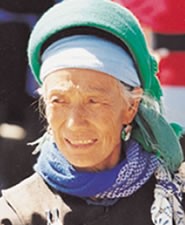Qixingmin in China

Photo Source:
Copyrighted © 2026
Operation China, Asia Harvest All rights reserved. Used with permission |
Send Joshua Project a map of this people group.
|
| People Name: | Qixingmin |
| Country: | China |
| 10/40 Window: | Yes |
| Population: | 5,900 |
| World Population: | 5,900 |
| Primary Language: | Chinese, Mandarin |
| Primary Religion: | Buddhism |
| Christian Adherents: | 0.00 % |
| Evangelicals: | 0.00 % |
| Scripture: | Complete Bible |
| Ministry Resources: | Yes |
| Jesus Film: | Yes |
| Audio Recordings: | Yes |
| People Cluster: | Tibeto-Burman, other |
| Affinity Bloc: | Tibetan-Himalayan Peoples |
| Progress Level: |
|
Introduction / History
The Qixingmin have lived in their present location and have been recognized as a distinct ethnic group for at least 400 years. During the Ming (1368-1644) and Qing (1644-1911) dynasties the Qixingmin were better known as Bai Erzi. During the Qing Dynasty they lived in mixed communities with the Yizi, Bouyei, Miao, and a group called the Baolu.
In the 1982 census the Qixingmin were not placed under any of the recognized nationalities but were instead placed in a list of Undetermined Minorities by the Chinese authorities. In 1985 they were reclassified under the Bai nationality who live more than 300 miles away in the Dali Prefecture of west central Yunnan. Similarly, the Longjia and Nanjingren peoples of Guizhou were included under the Bai minority. One source states the identification of the Qixingmin ethnicity is a problematic one, primarily because they are known by three different ethnic names: Qixingmin, Jing Ren, and Bai Erzi.
What Are Their Lives Like?
Despite their small numbers, the Qixingmin have a fierce reputation among their neighbors, who claim that the Qixingmin have hot tempers, that they are stubborn, and that they fight all the time. Visitors to a Qixingmin home are required to leave the house through a different door than the one by which they entered. The door is of great importance to the Qixingmin. Both the doors and the entrances to their villages are protected by regular cleansing ceremonies.
What Are Their Beliefs?
One of the main factors that make the Qixingmin a unique people in their area is their strong adherence to Buddhism. They are a Buddhist enclave surrounded by numerous animistic and Christian communities. Most Qixingmin use prayer beads to help them meditate, while some men become monks and join a monastery for extended periods of time, which is considered a great honor to their families.
Many have been exposed to the gospel from Han, Miao, and Yi believers living in the Weining and Shuicheng areas. The ethnic identity of the Qixingmin is integrally linked with Buddhism; to be a Qixingmin is to be Buddhist. The cost of going against their culture and the threat of probable expulsion from their community if they should become a Christian has proven too great an obstacle for the Qixingmin to overcome. Most churches in the area no longer attempt to evangelize them.
What Are Their Needs?
The Qixingmin people need to be willing to hear and accept the gospel, despite opposition to the religion, Christianity.
Prayer Points
Pray for a great awakening in the hearts of the Qixingmin that will lead them to Christ.
Pray that they would be able to go against the traditions of their culture in order to respond to the truth of the gospel.
Pray for protection for Qixingmin believers so that they can share the gospel among their people with effectiveness.
Pray for a work in the hearts of the Qixingmin so that when they hear the gospel that they would not reject it but respond positively to it.